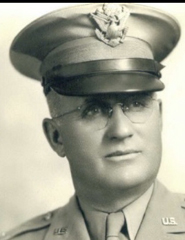FRANK MILES GOES TO ATHENS
Meets Iowans Credited With Amazing Valor
By FRANK MILES
(Iowa Daily Press War Correspondent)
Athens, Greece (IDPA)-- On a flight from Rome to Athens, after a jeep ride from the 5th army front to the Italian capital, I met 2 Greek-American army corporals near the Bari, Italy air field. They had finished months harassing nazis in the mountains of Greece. I took a letter from one to his mother in Athens, whom he had been unable to see because of the nature of his duties.
What the GIs told me sent me upon my arrival in Greece on a quest for a certain American officer, men who had led the Yankee forces, who parachuted into the country behind the German lines on the 2nd anniversary of Pearl Harbor - Dec. 7, 1943.
Among those I found a 49 year old veteran of World war I, all of whose comrades declared was the gamest man alive. He not only would not talk abut himself and what he had done but resolutely refused to let me use his name.
"I wouldn't say any of several my men was better than the others," he said to me, "but I do want you to meet a young captain who was with me all through the campaign."
He then related an amazing story of the captain's valor and skill.
That evening on a street corner I met the captain.
"How do you do," I said warmly, shaking the hand of the younger man, who appeared boyish for his 24 years of age. He was of medium height, slender, wore glasses and smiled like a high schooler.
"What is your name - again?" he inquired.
"Frank Miles"
"Good gosh," he exclaimed jumping two feet, "I've heard your name at home a thousand times. You and my dad know each other."
He was Robert Moyers, of Guthrie Center, whose father is Edison Moyers, a World war I veteran and superintendent of schools there, and had that position in Sidney, several years.
The young Hawkeye was a graduate from Guthrie Center high in 1937 and from the dental college at our State University in 1941. In February 1943 he entered the army. He was at Camp Grant awhile, landed at Africa overseas, was in the Battle of Sicily and in the fall of last year was sent to Palestine to be trained for parachuting so that he might as a medical officer go with a contingent of American troops on a drop from the air into Greece.
"I think he was picked for the job because at Alexandria he showed great ability as a horse back rider, which he probably acquired as a kid around your Sidney, American Legion rodeo," his chief grinned.
Captain Moyers wanted to talk about home and his commanding officer; the latter tried to talk about him and the cross fire I got little about the former there that I hadn't learned earlier from some of those who had served with him.
His job was both wracking and dangerous. He had been doctor rather than dentist to wounded and sick Americans and partisans under unbelievably difficult conditions with enemies shooting around him almost constantly. Despite shortages he raced around in one way or another accomplishing his tasks. In one night he set up and moved a tent hospital three times to escape nazis bent upon getting him.
Captain Moyers merely smiled when I told him what I knew of his record, but he did say that after the war he intended to return to Iowa to devote his career to child growth and development.
"The worse part was getting out, then I wondered what was down there," he replied to my question as to how he felt that dark night he leaped from a plane to alight somewhere in Greece under the American flag.
John Gkikizan, now an Athens resident, whose right leg was amputated at Fort Des Moines after it had been shattered when he was fighting in the 32nd division of the A.E.F. in 1918, said he would never cease being grateful to the Frankels of Des Moines; the Welchs of Iowa City; and the Woodbury's of Marshalltown for their kindness when he was in Iowa recovering from the operation.
Harry Mauricides, of the American Embassy staff here, is a personal friend of Judge George Paradise, Sioux City, who was born in Crete, still occupied by the Germans when this was written.
Source: Mason City Globe-Gazette, December 26, 1944
![]()

